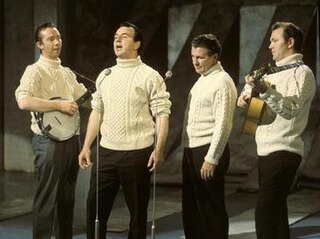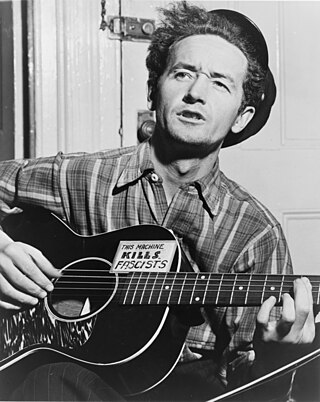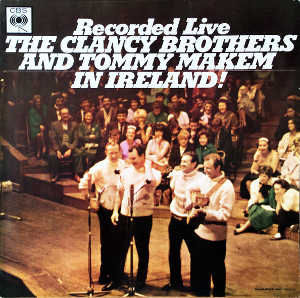
The Clancy Brothers were an influential Irish folk music group that developed initially as a part of the American folk music revival. Most popular during the 1960s, they were famed for their Aran jumpers and are widely credited with popularising Irish traditional music in the United States and revitalising it in Ireland, contributing to an Irish folk boom with groups like the Dubliners and the Wolfe Tones.

Patrick Michael Clancy, usually called Paddy Clancy or Pat Clancy, was an Irish folk singer best known as a member of the Clancy Brothers and Tommy Makem. In addition to singing and storytelling, Clancy played the harmonica with the group, which is widely credited with popularizing Irish traditional music in the United States and revitalizing it in Ireland. He also started and ran the folk music label Tradition Records, which recorded many of the key figures of the American folk music revival.

Thomas Joseph Clancy was a member of the Irish folk group the Clancy Brothers. He had the most powerful voice of the brothers and had previously been an actor in numerous stage productions, appearing with Orson Welles in King Lear. He also performed often on television and occasionally in the movies.

Liam Clancy was an Irish folk singer from Carrick-on-Suir, County Tipperary. He was the youngest member of the influential folk group the Clancy Brothers, regarded as Ireland's first pop stars. They achieved global sales of millions and appeared in sold-out concerts at such prominent venues as Carnegie Hall and the Royal Albert Hall.
Makem and Clancy was an Irish folk duo popular in the 1970s and 1980s. The group consisted of Tommy Makem and Liam Clancy, who had originally achieved fame as a part of the trailblazing folk group The Clancy Brothers and Tommy Makem in the 1960s. Makem and Clancy sang a combination of traditional Irish music, folks songs from a variety of countries, and newly written pieces, including compositions that Tommy Makem himself wrote. One reporter described their music as "more polished and varied than that used by the Clancy Brothers."

The Rising of the Moon: Irish Songs of Rebellion is a collection of traditional Irish folk songs performed by The Clancy Brothers and Tommy Makem. It was the group's first album and was initially recorded in 1956. For the original recording, the only instrument used was Paddy Clancy's harmonica, since Tommy Makem had damaged his hand and Liam Clancy was still learning how to play the guitar. The group had yet to develop its distinctive musical sound, so there was little ensemble singing.

Come Fill Your Glass with Us: Irish Songs of Drinking & Blackguarding is a collection of traditional Irish drinking songs that first brought The Clancy Brothers and their frequent collaborator Tommy Makem to prominence. It was their second album and was released in 1959 by Tradition Records, a small music label run by one of the Clancy Brothers, Paddy Clancy. A reviewer for the folk and world music magazine, Dirty Linen, later called this the album that "launched the Clancy Brothers to fame in the Americas and helped launch a revival of interest in traditional Irish music."
Makem and Spain was an Irish-American folk music band. The band was founded as "The Makem Brothers" in February 1989 by Rory, Shane, and Conor Makem, the three sons of "The Godfather of Irish Music" Tommy Makem, and grandsons of Irish source singer Sarah Makem.

The American folk music revival began during the 1940s and peaked in popularity in the mid-1960s. Its roots went earlier, and performers like Josh White, Burl Ives, Woody Guthrie, Lead Belly, Big Bill Broonzy, Richard Dyer-Bennet, Oscar Brand, Jean Ritchie, John Jacob Niles, Susan Reed, Paul Robeson, Bessie Smith, Ma Rainey and Cisco Houston had enjoyed a limited general popularity in the 1930s and 1940s. The revival brought forward styles of American folk music that had in earlier times contributed to the development of country and western, blues, jazz, and rock and roll music.
Tradition Records was an American record label from 1955 to 1966 that specialized in folk music. The label was founded and financed by Guggenheim heiress Diane Hamilton in 1956. Its president and director was Patrick "Paddy" Clancy, who was soon to join his brothers Liam and Tom Clancy and Tommy Makem, as part of the new Irish folk group, The Clancy Brothers and Tommy Makem. Liam Clancy designed the company's maple leaf logo. Columbia University Professor of Folklore Kenneth Goldstein was also involved in the early creation of the company, which operated out of Greenwich Village, New York, United States.
Diane Hamilton was the pseudonym of Diane Guggenheim, an American mining heiress, folksong patron and founder of Tradition Records.

The Lark in the Morning is an album by Liam Clancy, Tommy Makem, family and friends.

Robert Joseph 'Bobby' Clancy Jr was an Irish singer and musician best known as a member of The Clancy Brothers, one of the most successful and influential Irish folk groups. He accompanied his songs on five-string banjo, guitar, bodhrán, and harmonica.
Dan Milner is a singer of traditional Irish songs, a scholar-teacher and a writer. Born Daniel Michael Milner on March 27, 1945 in Birmingham, England to an Irish mother, Nora Mary Cremin of Brosna, County Kerry, and an Irish-English father, Willam Milner, he is the younger brother of Liam Donal Padraig Milner (1940-2008), who was also a fine singer. The Milner family moved frequently following World War II, the result being the brothers grew up in far-flung localities including Birmingham; Ballybunion, County Kerry; Toronto, Canada and Brooklyn, New York.

Robbie O'Connell is an Irish singer songwriter who performs solo, as well as with The Green Fields of America. He also appears with Dónal Clancy (cousin), Dan Milner, and fiddler Rose Clancy. O'Connell has also toured and recorded with The Clancy Brothers, being their nephew. For over 20 years, he has conducted small cultural tours to Ireland with Celtica Music & Tours and, for more than ten years, WGBH Learning Tours. Married with four grown children, he now spends his time between Bristol, Rhode Island and Waterford.
Louisa "Lou" Jo Killen was an English folk singer from Gateshead, Tyneside, who also played the English concertina.

Finbarr Clancy is an Irish folk singer and multi-instrumentalist. Early in his career he performed with The Clancy Brothers. He later became a member of the group The High Kings.

The Clancy Brothers & Tommy Makem is a collection of traditional Irish songs performed by The Clancy Brothers with frequent collaborator Tommy Makem. It was their third album and their final one for Tradition Records, the small label that the eldest Clancy brother Paddy Clancy ran. After this, the group recorded exclusively for Columbia Records until 1970. This was the first album for which they used the group name, The Clancy Brothers and Tommy Makem. Their prior recordings had simply listed their individual names on the cover.

Isn't It Grand Boys is a 1966 studio album by the Clancy Brothers and Tommy Makem. It was the Irish folk group's seventh album for Columbia Records and their tenth album over all. Tommy Makem wrote the liner notes.

Recorded Live in Ireland is a 1965 album of Irish folk songs performed by The Clancy Brothers and Tommy Makem. It was the first live album to be recorded in stereo in Ireland. It was their sixth LP for Columbia Records and, unusually for the group, included two newly composed songs in the folk style. Music critic Joe Goldberg wrote the liner notes.














